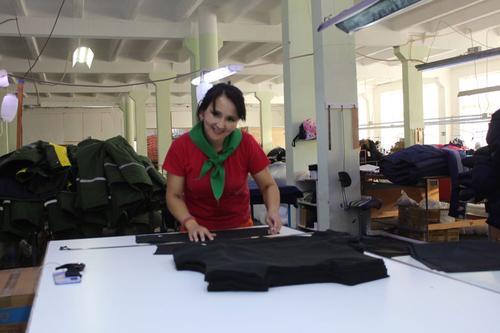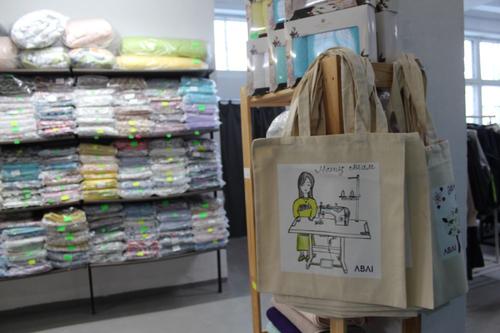From the outside, it may seem that there are no other enterprises in the Karaganda region apart from coal mines and metallurgical plants. However, there are indeed others! For instance, a sewing factory located in a mono-city named after the great Kazakh poet and educator. Here, they create clothing for those who want to look stylish: T-shirts, sports suits, hoodies, sweatshirts, jackets, and parkas. All of this is made in the popular casual style today, which emphasizes comfort, simplicity, and ease of cut...
Currently, the sewing enterprise operates in the same four-story brick building where it was housed during Soviet times. During the crisis of the 1990s, the company went bankrupt. The property remained mortgaged to the bank for many years. The factory building was disconnected from utilities and gradually fell into disrepair. However, seven years ago, local entrepreneur Nurkhan Zhumabekov purchased it, restored it, and began to revive the sewing production.
Now, there are sewing, cutting, and embroidery workshops, a large warehouse, and a showroom where you can view, try on, and purchase clothing made in Abai. Approximately 100 people work at the factory, the majority of whom are seamstresses. There are also cutters, designers, and technologists who focus on developing new models. The enterprise produces goods worth 700 million tenge annually.
It is worth mentioning that the revived factory initially started with the production of workwear, but then grew to include mass-market clothing. This niche in the Karaganda region was unoccupied: few are willing to step outside the standard workwear norms for miners, metallurgists, or energy workers.
– Sewing workwear is easier. In this case, you deal with one client who places an order for a hundred or a thousand sets, – reflects the director of the Abai Sewing Factory, Nurkhan Zhumabekov. – In casual, you work with the consumer one-on-one. You need to sew in a way that makes the buyer want to purchase your garment. For this, you need to consider many factors: the desires of the person, their financial capabilities, fashion trends...

In November 2023, representatives of the Abai Sewing Factory, along with six other domestic manufacturers, traveled to Germany for the prestigious international fair, Berlin Bazaar. At this event, creative entrepreneurs from 60 countries showcased their goods. The Abai seamstresses brought their best products to the exhibition. They not only managed to display their goods effectively but also sold them. The clothing featuring the ABAI logo was particularly popular among our former compatriots.
– For them, it’s nostalgia. However, our clothing was not purchased out of pity but because they calculated the price-to-quality ratio and were satisfied, – shares the entrepreneur. – Participating in the fair was a valuable experience for me. I observed the range of clothing from various countries and concluded that we can sew just as well. Most importantly, I confirmed that our products interest people.
German businessmen also appreciated the quality of goods made in Abai. Nurkhan Zhumabekov even received an offer to produce clothing under a German label for sale in the Kazakh market. The entrepreneur was intrigued by international collaboration, but for now, he decided to hold off and focus on promoting his own brand. The Abai manufacturer primarily sells its clothing online.
In addition, he has a branded shop located on the first floor of the factory. A correspondent from "Kazpravda" visited it. This bright space features numerous racks lined with colorful jackets, windbreakers, raincoats, sports suits, and hoodies for both adults and children, as well as school uniforms. On the shelves, there are backpacks with the ABAI logo, alongside popular shopping bags made from durable canvas. Some are adorned with traditional Kazakh patterns, while others feature children's drawings.
– Last summer, we held a children's drawing competition under the factory's auspices, – explains the seller, Svetlana, as she shows the shopping bags. – Children drew the sewing factory, their mothers, their hometown, and Abai Kunanbayev himself. Then our specialists selected the best drawings, transferred them to prints, and printed them on canvas shopping bags. This is our social project.

It’s clear that Svetlana loves her factory and takes pride in the quality of its products. Therefore, she seizes every opportunity to showcase the merchandise. She asks me to pay attention to the material, the neat stitching, and the originality of the designs. I even try on several winter jackets, hoping to find something to buy.
I learn that some models have unique names created by the designers. For example, the "Moscow" jacket features large patch pockets and distinctive inserts on the sleeves. The idea for its creation came to the master during a trip to the Russian capital. Meanwhile, the winter coat named "Jennifer" was named after the singer for its cut that accentuates the female figure.
– I wear our clothing myself, – Svetlana smiles. – I recently bought a warm sports suit. I wear it both at home and outside. We also got this bright yellow winter jacket with pants for my granddaughter. It’s warm and windproof. The child loves it.
Customers don’t frequently visit the factory shop. Some simply don’t know it exists, while others habitually prefer imported goods. After all, clothing from Turkey, China, and Kyrgyzstan is abundant in the Kazakh market. Why can’t we create worthy competition for foreign manufacturers? What holds us back: a lack of quality raw materials, specialists, or insufficient working capital?
– We lack faith in ourselves! – believes the director of the Abai Sewing Factory, Nurkhan Zhumabekov. – Unfortunately, we have very few domestic productions. Many rely on government orders, while they fear to operate in a market and competitive environment. This, I believe, is our main problem.